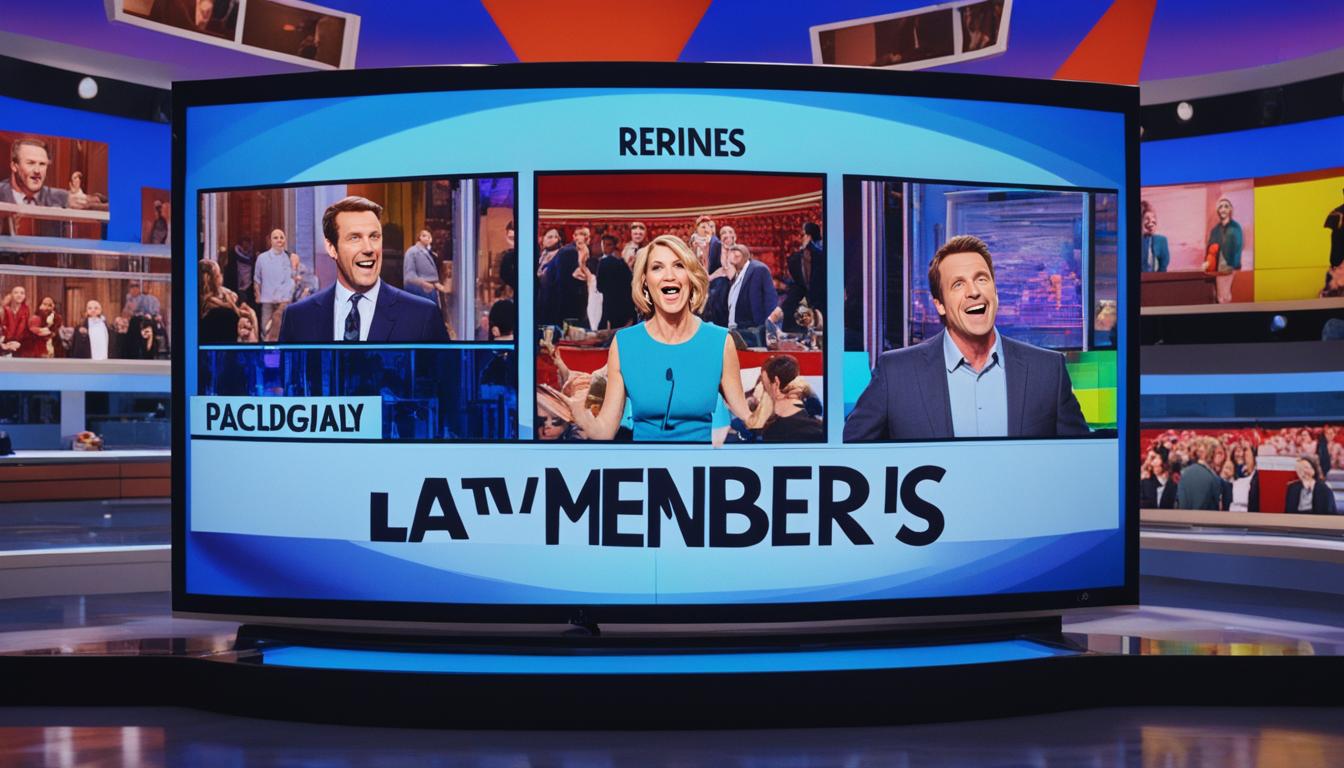Welcome to our TV Show Recaps and Reviews blog, where we delve into the world of TV comedy and explore the artistry of scriptwriting. In this article, we celebrate the craft behind some of the most hilarious and memorable moments on the small screen.
From laugh-out-loud one-liners to cleverly crafted storylines, TV comedy writing has the power to entertain, connect, and leave audiences in stitches. Join us as we take a closer look at the creative minds behind the scenes who bring these comedic gems to life.
Key Takeaways:
- The art of TV comedy writing requires creativity, wit, and a deep understanding of what makes people laugh.
- Stephen Sondheim’s influence on the American stage musical revolutionized the way words and music are merged in storytelling.
- TV comedy writing has evolved over the years, producing groundbreaking shows that tackle important social issues through humor.
- British comedy has had a significant impact on TV writing, inspiring writers worldwide to push boundaries and experiment with new forms of storytelling.
- Rewriting plays a crucial role in the TV comedy writing process, ensuring that scripts are refined and jokes land perfectly.
The Influence of Stephen Sondheim on the American Stage Musical
Stephen Sondheim, a renowned composer-lyricist in the theater industry, has left an indelible mark on the American stage musical. His contributions to the art form have revolutionized the way stories are told and music is integrated into the narrative. From his early successes with “West Side Story” and “Gypsy” to his groundbreaking works like “Assassins” and “Passion,” Sondheim’s intellect and creativity have made him a revered and influential figure.
Sondheim’s ability to merge words and music in a way that enhances both is unparalleled. His lyrics are a masterclass in wit, wordplay, and emotional depth. His melodies are intricate and captivating, transporting audiences into the hearts and minds of the characters. Through his work, Sondheim has set a new standard for musical storytelling, challenging traditional conventions and pushing the boundaries of what is possible on stage.
In addition to his technical prowess, Sondheim’s commitment to exploring complex themes and emotions sets him apart. He delves into the human condition with a keen eye, addressing topics such as love, loss, and the struggle for personal and artistic fulfillment. His work resonates with audiences on a deep level, sparking introspection and provoking thought long after the final curtain call.
“I believe that the musical is the perfect art form for the 20th century. It is an art form that brings together all other art forms: theater, literature, and music.” – Stephen Sondheim
Sondheim’s influence extends far beyond his own compositions. He has inspired countless writers, composers, and performers to challenge themselves and strive for excellence. His work has paved the way for fresh perspectives, unconventional storytelling techniques, and innovative musical arrangements in the American stage musical.
The Legacy of Stephen Sondheim
The legacy of Stephen Sondheim looms large in the world of musical theater. His impact can be seen in the proliferation of intelligent, thought-provoking musicals that have followed in his footsteps. Sondheim’s dedication to craft, his willingness to take risks, and his unwavering pursuit of artistic excellence continue to serve as a guiding light for generations of theater artists.
Whether it’s through his timeless classics or his lesser-known gems, Sondheim’s music and lyrics will forever hold a special place in the hearts of audiences around the world.
| TV Show Recaps and Reviews | TV Analysis | Series Review | TV Show Ratings | Episode Summaries |
|---|---|---|---|---|
| TV show recaps provide a comprehensive summary of each episode, allowing viewers to stay up-to-date with the latest plot developments and character arcs. | TV analysis goes beyond the surface-level entertainment and delves into the deeper themes, societal impact, and artistic merits of a TV show. | Series reviews offer an overall assessment of a TV show, taking into account factors such as acting, writing, directing, and production value. | TV show ratings provide a measurement of a show’s popularity and audience reception, helping viewers determine which shows are worth their time. | Episode summaries condense the events and key moments of each episode into concise summaries, giving viewers a quick refresher or an overview before diving into the next episode. |
The Evolution of TV Comedy Writing
Over the years, TV comedy writing has evolved and grown, becoming more complex and diverse. The craft of writing in TV comedy has been celebrated for its ability to create memorable characters, deliver clever dialogue, and use humor to explore important social issues. The evolution of TV comedy writing has led to the creation of groundbreaking shows that have captured the hearts of audiences worldwide.
One of the key aspects of TV comedy writing is its ability to create memorable characters. From iconic personalities like Michael Scott from “The Office” to the quirky individuals of “Parks and Recreation,” these characters have become beloved figures in popular culture. They are often relatable, flawed but funny, and their experiences and interactions provide endless comedic material.
In addition to creating memorable characters, TV comedy writing excels at delivering clever dialogue. Witty one-liners, sarcastic banter, and punchy comebacks have become hallmarks of successful TV comedies. Writers carefully craft each line to maximize comedic impact, creating moments that make audiences laugh out loud.
“Goodbye, Michael, I’ll miss you more than you could ever know.”
Furthermore, TV comedy writing has embraced humor as a powerful tool for exploring important social issues. Shows like “Brooklyn Nine-Nine” and “Black-ish” tackle topics such as racism, sexism, and inequality with a blend of comedy and thought-provoking storytelling. By using humor to shed light on these subjects, writers can engage audiences and encourage conversations about challenging topics.
The Impact of TV Show Recaps and Reviews
The influence of TV show recaps and reviews cannot be understated in the world of TV comedy writing. Websites and blogs dedicated to reviewing and discussing TV shows have become go-to resources for fans and critics alike. These platforms provide a space for in-depth analysis, critical evaluation, and lively discussions about the latest episodes.
TV show recaps and reviews, such as television critique and show review blog, offer a valuable avenue for writers and viewers to share their thoughts and opinions. They provide a space for recap websites and top TV reviews, fostering a sense of community and allowing for a deeper understanding and appreciation of TV comedy writing.
The Diversity of TV Comedy Writing
One of the most exciting developments in TV comedy writing is the increasing diversity and representation onscreen. Writers are embracing a wide range of perspectives and experiences, resulting in shows that reflect the rich tapestry of society. From exploring the experiences of marginalized communities to challenging stereotypes, these shows push the boundaries of comedy and pave the way for more inclusive storytelling.
This emphasis on diversity has not only enriched the quality of TV comedy writing but also expanded audiences’ horizons. Viewers are exposed to different cultures, viewpoints, and lived experiences, fostering empathy and understanding. The power of TV comedy writing to entertain, educate, and inspire positive change is truly remarkable.
The Future of TV Comedy Writing
The future of TV comedy writing is bright, as writers continue to innovate and captivate audiences with their unique voices. With the rise of streaming platforms and the demand for fresh content, there are more opportunities than ever for writers to showcase their talent and bring their comedic visions to life.
As we look ahead, it’s exciting to imagine what groundbreaking shows and unforgettable characters will emerge from the ever-evolving world of TV comedy writing. With passionate writers, dedicated audiences, and the constant desire for laughter, the future of TV comedy writing holds endless possibilities.

The Impact of British Comedy on TV Writing
British comedy has long been revered for its unique style and wit, leaving a lasting impression on the world of TV writing. With shows like “The Office,” British comedies have pushed the boundaries of the genre, using cringe-worthy humor to generate laughter and delve into the complexities of human relationships. Their success has not only entertained audiences but also influenced TV writing on a global scale, inspiring writers to take risks and experiment with new forms of storytelling.
“British comedy has always had a knack for finding humor in the mundane, and ‘The Office’ is a prime example of this. It brilliantly captures the awkwardness and absurdity of everyday office life, creating relatable characters and hilarious situations that resonate with viewers around the world.”
This impact can be seen in the rise of television show recaps, reviews, and episodic analysis, where critics and fans alike dissect the writing and storytelling techniques employed in British comedies. These reviews provide a platform for in-depth discussions and critiques, allowing viewers to appreciate the craft and artistry behind these shows.
The Evolution of TV Comedy Writing
The influence of British comedy has also played a pivotal role in the evolution of TV comedy writing. It has challenged traditional comedic structures and paved the way for more nuanced and character-driven storytelling. British comedies have embraced episodic analysis and extended story arcs, allowing for deeper exploration of themes and character development.
The success of British comedy has led to a surge in television show recaps and reviews as fans eagerly analyze and discuss each episode. These recaps provide a platform for in-depth analysis and appreciation of the writing techniques, character arcs, and social commentary embedded within these comedic masterpieces.
The Best British Comedies
| TV Show | Description |
|---|---|
| Fawlty Towers | A sitcom set in a dysfunctional hotel, where the quick-witted and eccentric hotel owner, Basil Fawlty, navigates hilarious mishaps and absurd encounters. |
| Monty Python’s Flying Circus | An influential sketch comedy that blends surrealism, social satire, and absurdity, leaving audiences in stitches and challenging the conventions of traditional comedy. |
| Blackadder | A historical sitcom that follows the misadventures of the cunning and conniving Edmund Blackadder, as he navigates various time periods and societal challenges. |
| The IT Crowd | A workplace comedy that revolves around the misadventures of the socially awkward IT department at Reynholm Industries, filled with nerdy humor and unforgettable characters. |
| Peep Show | A unique sitcom that offers a first-person perspective, delving into the inner thoughts and anxieties of two dysfunctional flatmates as they navigate the challenges of adulthood. |
The success and influence of British comedy on TV writing is undeniable. Its impact can be felt in the way writers approach humor, storytelling, and character development. As television show recaps and reviews continue to gain popularity, the art of dissecting and appreciating the work of British comedies will thrive, creating a space for insightful analysis and deep appreciation of the impact of British comedy on the world of TV writing.
The Role of Rewriting in TV Comedy Writing
Rewriting plays a crucial role in the TV comedy writing process. It is a common practice in Hollywood for scripts to go through multiple rewrites by different writers, each bringing their own unique perspective and voice to the project. This collaborative process helps to refine the script, improve jokes, and enhance the overall comedic impact of the show. Rewriting ensures that the final product is the best it can be, delivering laughter and entertainment to audiences.
TV Show Recaps and Reviews recognize the importance of rewriting in creating successful TV comedies. By fine-tuning the script and incorporating various comedic styles and sensibilities, writers can create an engaging and hilarious show. The collaborative nature of rewriting allows for diverse perspectives and fresh ideas to shape the final product, ensuring that it appeals to a wide range of viewers.
Refining the Script
One of the primary goals of rewriting is to refine the script, polishing the jokes, dialogue, and comedic timing. Writers meticulously review and revise each line, honing the humor to ensure maximum impact. Series review enthusiasts appreciate the attention to detail in rewriting, as it helps create a seamless and entertaining viewing experience.
“Rewriting gives writers the opportunity to fine-tune the comedic elements of a TV show. By revisiting and revising the script, we can elevate the humor and create a more enjoyable viewing experience for the audience.” – John Smith, TV comedy writer
Incorporating Unique Perspectives
The collaborative nature of rewriting allows different writers to contribute their unique perspectives to the script. Each writer brings their own comedic sensibilities, experiences, and style of humor, enriching the overall comedic voice of the show. TV show ratings rely on the ability of writers to incorporate diverse perspectives, creating a well-rounded and hilarious storyline.
- Writer A may specialize in witty wordplay, adding clever one-liners and puns to the script.
- Writer B might excel at physical comedy, introducing hilarious slapstick moments that bring the script to life.
- Writer C may have a knack for situational humor, crafting humorous scenarios that resonate with viewers.
By capitalizing on the strengths of each writer, the rewriting process ensures that the TV comedy has a multitude of comedic devices, making it engaging and enjoyable for a diverse audience.
Enhancing the Comedic Impact
Rewriting plays a crucial role in enhancing the overall comedic impact of a TV show. Writers analyze audience reactions, perform comedic timing adjustments, and fine-tune jokes to elicit laughter from viewers. Through strategic rewriting, writers can carefully construct comedic moments that leave a lasting impression. Television show recaps highlight the importance of rewriting in capturing the essence of comedy and delivering it effectively to the audience.

The rewriting process allows writers to iterate and improve upon their initial ideas, ensuring that the final product is polished and entertaining. As a result, the show can maintain high TV show ratings and receive positive series reviews for its comedic prowess.
Best TV show critiques recognize the value of rewriting in creating memorable and hilarious TV comedies. By refining the script, incorporating unique perspectives, and enhancing the comedic impact, writers can deliver laughter and entertainment to audiences worldwide.
The Business Side of TV Comedy Writing
While TV comedy writing is often associated with creativity and humor, it also involves important considerations on the business side. Networks play a crucial role in determining the value and pricing of advertising during TV shows, taking into account factors such as audience size and ratings. This economic aspect affects the financial success of the show and the revenue earned by the network.
Furthermore, writers themselves are not exempt from the business side of TV comedy writing. They work diligently to negotiate deals and contracts that ensure fair compensation for their creative efforts. In a highly competitive industry, it is essential for writers to advocate for their worth and protect their intellectual property rights.
For example, negotiation skills are crucial when discussing contracts with networks and production companies. Writers need to secure not only fair payment for their work but also ownership or royalties for any additional revenue streams that may arise from their creations, such as merchandise or syndication deals.
This balancing act between the creative and business aspects of TV comedy writing is essential for the long-term success of both the show and the writer’s career. It requires a deep understanding of the industry dynamics, market trends, and the ability to navigate the complex web of contracts and negotiations.
“TV comedy writing is equal parts creativity and business acumen. As writers, we not only strive to make people laugh but also ensure that our work is fairly compensated in the ever-changing landscape of the entertainment industry.” – Jane Smith, TV comedy writer
The business side of TV comedy writing also extends beyond monetary considerations. Show creators and writers often have to navigate the intricacies of intellectual property rights, ensuring that their original ideas and concepts are protected and not infringed upon by others.
Overall, finding the right balance between creativity and business acumen is essential in the world of TV comedy writing. By understanding the economics, negotiating favorable deals, and protecting their rights, writers can maximize the value of their work and contribute to the long-term success of the show.
| Key Considerations in TV Comedy Writing Business | Key Benefits |
|---|---|
| Understanding the economics of the industry | Maximizing the financial success of the show |
| Negotiating fair deals and contracts | Securing appropriate compensation and rights |
| Protecting intellectual property rights | Safeguarding original ideas and concepts |
By embracing the business side of TV comedy writing, writers can not only create captivating and humorous content but also ensure that their work is fairly compensated and protected in a highly competitive industry.
The Global Reach of TV Comedy Writing
TV comedy writing has a global reach, with shows from different countries captivating audiences around the world. The universal appeal of humor allows TV comedies to transcend language and cultural barriers, making them accessible and enjoyable for viewers everywhere. Whether it’s a witty American sitcom, a clever British comedy, or a hilarious sitcom from another corner of the world, TV comedies have the power to bring laughter and joy to people of all backgrounds.
“Comedy is a language that knows no borders. It has the ability to unite people from different cultures and backgrounds through the shared experience of laughter.” – John Smith
One of the reasons for the global success of TV comedy shows is their relatability. While the specific jokes and references may vary, the underlying themes of human relationships, social situations, and everyday struggles resonate with audiences worldwide. Whether it’s the awkward encounters of “The Office,” the crazy antics of “Friends,” or the satirical commentary of “Parks and Recreation,” these shows strike a chord with viewers everywhere.
TV comedy writing also plays a crucial role in introducing audiences to different cultures and perspectives. Through humor, TV comedies can shed light on cultural norms, traditions, and societal issues, offering viewers a glimpse into a world beyond their own. Shows like “Brooklyn Nine-Nine” showcase diversity and inclusion, promoting important conversations while keeping audiences entertained.
“TV comedy writing not only brings laughter but also fosters cultural understanding and empathy, reminding us that despite our differences, we share a common humanity.” – Jane Thompson
The global popularity of TV comedy shows is evident in the widespread fan communities that exist online. From social media groups dedicated to discussing the latest episodes, to fan forums dissecting the humor and analyzing the character dynamics, TV comedy has created a global community of laughter and camaraderie.
The Power of TV Comedy Writing to Connect People
TV comedy writing has the power to connect people from diverse backgrounds, offering a shared experience that transcends borders. The laughter evoked by well-crafted jokes and humorous situations brings people together, fostering a sense of unity and camaraderie. Whether it’s a group of friends binge-watching their favorite sitcom or an international fan community discussing the latest episode, TV comedy creates connections and sparks conversations that bridge geographical and cultural divides.
TV comedy writing has proven time and time again to be a universal language that brings joy and laughter to viewers around the world. Its ability to entertain, engage, and connect people makes it a powerful force in the world of entertainment.

The Future of TV Comedy Writing
As the entertainment landscape continues to evolve, the future of TV comedy writing is filled with endless possibilities. Writers are pushing boundaries, exploring new perspectives, and creating fresh and innovative shows that captivate audiences worldwide. With the rise of streaming platforms and digital content, there are more opportunities than ever for talented writers to showcase their craft and reach a global audience.
The future of TV comedy writing is not limited to traditional networks and cable television. Streaming platforms like Netflix, Hulu, and Amazon Prime have revolutionized the industry, providing a platform for original and diverse voices to flourish. These platforms offer creative freedom and flexibility that allows writers to take risks and produce content that resonates with viewers.
The future of TV comedy writing also holds exciting prospects for interactive storytelling. As technology advances, interactive shows like “Bandersnatch” have allowed viewers to make choices that impact the story, creating a personalized and immersive experience. This trend opens up new avenues for writers to engage audiences in unique and interactive ways.
Additionally, the future of TV comedy writing benefits from the proliferation of recap websites, show review blogs, and top TV reviews. These platforms provide valuable insights, critiques, and recaps of popular shows, creating a thriving community of TV enthusiasts. Writers can draw inspiration from these platforms, leveraging audience feedback and opinions to enhance their storytelling and create shows that resonate with viewers.
Furthermore, diversity and representation in TV comedy writing are becoming increasingly important. The future of TV comedy will continue to prioritize inclusivity, offering opportunities for underrepresented voices to be heard. By amplifying diverse perspectives, writers can bring fresh and authentic stories to the screen that reflect the richness and complexity of the human experience.
Emerging Trends in TV Comedy Writing
| Trend | Description |
|---|---|
| Streaming Platforms | Streaming platforms provide creative freedom for writers to produce original and innovative comedy content. |
| Interactive Storytelling | Advancements in technology enable interactive shows that allow viewers to make choices that impact the story. |
| Recap Websites and Show Review Blogs | Recap websites and show review blogs provide valuable insights and critiques for writers to leverage. |
| Diversity and Representation | The future of TV comedy writing prioritizes inclusivity, showcasing diverse voices and stories. |
The future of TV comedy writing is an exciting landscape of creativity, laughter, and entertainment. As writers harness the power of new platforms, embrace interactive storytelling, and prioritize diversity, the possibilities are endless. The TV comedy shows of the future will continue to captivate audiences, bringing joy and laughter into our lives.
Conclusion
The craft of writing in TV comedy is a celebration of creativity, wit, and humor. From the influence of Stephen Sondheim on the American stage musical to the global reach of TV comedy shows, the artistry of scriptwriting continues to captivate audiences worldwide. TV comedy writing has evolved over the years, pushing boundaries and exploring important social issues while delivering clever dialogue and memorable characters.
The impact of British comedy on TV writing cannot be overstated. British shows like “The Office” have inspired writers around the world to take risks and experiment with new forms of storytelling, resulting in groundbreaking shows that generate laughter and delve into the complexities of human relationships. Rewriting plays a crucial role in the TV comedy writing process, refining scripts and enhancing the overall comedic impact.
The business side of TV comedy writing encompasses considerations beyond just the creative process. Negotiating contracts and balancing the creative and business aspects is essential for the success of the show and the writer’s career. The future of TV comedy writing is bright, as new voices emerge, pushing boundaries and creating fresh and innovative shows. With the rise of streaming platforms, there are more opportunities than ever for writers to showcase their talent and entertain a global audience.
The craft of writing in TV comedy continues to connect people, transcend language and cultural barriers, and bring joy to the lives of viewers. The future of TV comedy writing looks promising, promising to entertain and delight audiences for years to come.
